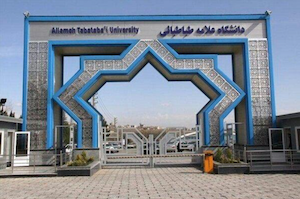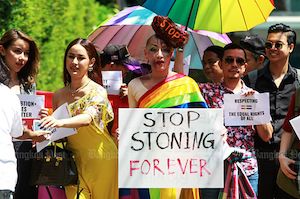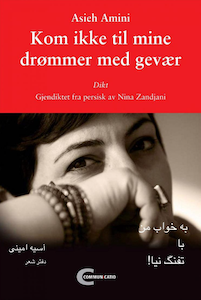
Stoning is a punishment for women in Iran who have been convicted of adultery, and while this practice is used for everyone, women are generally targeted for this punishment simply because of their gender. Stoning involves the practice of throwing stones at someone until they die. Although this is almost fully abolished, areas controlled by the Taliban still employ this method. The last public case was in July 2012 when a 21-year-old was stoned in front of one hundred and fifteen men because she was accused of committing moral crimes. Asieh Amini became passionate at a young age about what was happening while fueling her ambition to make a change in the world, especially in the place where she grew up.
Although Amini lived a very privileged life, her family had to adapt to their new circumstances during the Iranian Revolution. Wearing a black hijab during her childhood, she developed her passion for journalism.
In 1993, Amini started journalism school at Tabataba’i University, which is located in Tehran. Although most of her work was censored by the government, it did not stop her. She created a blog that dove into the issues of Iran, more specifically of the North, her home.

In a Youtube interview with Pen International, Amini describes how being a mother has changed her views of the word exile. After being “kicked out” of her country in 2007, she realised that she could create her home anywhere. Amini believes that as long as she has her family, she has her home. Although she expressed that she has not told her daughter about her work because it is too dark considering her young age, she always talks to her about how proud she is to be Iranian. She stated “This is who I am,” explaining how she will never change and will continue to be a warrior for all women.
“When she discovered that the most hardline judges in Iran were continuing to sentence women and others to death by stoning because they thought they answered to a higher authority than the law of the land, Amini co-created the “Stop Stoning Forever” campaign in 2006, wrote "The Blog of Awesome Women

Not only has Amini covered multiple stories of abuses by the Taliban and the Iranian government, she is also one of the greatest contributors to the Stop Stoning Forever Campaign. This campaign has not only inspired Middle Eastern countries, but has also inspired countries like Kenya to help out with these issues. This was a collaborative effect all around the country and included many pro-bono lawyers to help. Although Amini believes that conditions might be growing worse for the women in Iran, she believes that there will be hope for the country to stand up and fight for what they believe in. When the members of the campaign were informed about the stoning of a man and woman, they worked to halt the execution in less than 48 hours. Not only did this change their lives, but it also taught the campaign the power of social media and connections.
Asieh Amini is married with a daughter, and this has not stopped her from achieving her goals. Along with her grant, she won the Freedom Prize called Ord i Grenseland in 2014. This award is given to a female fiction writer or a poet who has been threatened, imprisoned, or prosecuted. On top of that, Asieh won the Oxfam Novib/PEN award (2012), which is awarded to people who were forced to flee due to their critical writing.
Amini has been through a significant number of struggles throughout her life. In 2007, she faced a short imprisonment time for her actions. Amini faced jail time because the authorities were monitoring her every action, meaning that they realised she was fighting to change the law and advocating for the stop of stoning. She was released in 2009 and fled to Norway. She faced many new challenges moving to a country where she did not speak the language. Amini recalls her hardship when she arrived in Norway, as she did not speak the language that her daughter spoke. Currently, in Norway, she is writing a poetry book, a new documentary book, while also finishing her Master’s degree at Norwegian University of Science and Technology. A truly influential woman in this world.
Why Did I Choose to Research Asieh Amini?
I chose to research this woman because compared to her impact on Iranian women, her social recognition is very minimal. Although this is not her main goal, Asieh Amini is a role model that is paving the way for future activists, and even has the ability to change the law and ways of her country, and that of others.
Works Cited
“Asieh Amini.” ICORN, https://www.icorn.org/writer/asieh-amini. Accessed 18 June 2022.
Breukel, Koos, and Becca Anderson. “ASIEH AMINI: TAKING ACTION FOR A CAUSE”. The Blog of Awesome Women, 7 May 2021, https://theblogofawesomewomen.wordpress.com/2021/05/07/asieh-amini-taking-action-for-a-cause-3/. Accessed 18 June 2022.
Dossou, Gilles. “Iranian poet and journalist Asieh Amini is awarded Freedom prize.” ICORN, 3 September 2014, https://www.icorn.org/article/iranian-poet-and-journalist-asieh-amini-awarded-freedom-prize. Accessed 18 June 2022.
Litteraturhuset, Sellanraa. “Feminism in Iran: A Conversation with Asieh Amini.” Litteraturhuset i Trondheim, 18 3 2019, https://litteraturhusetitrondheim.no/arrangement/feminism-in-iran-a-conversation-with-asieh-amini/. Accessed 18 June 2022.
“Meet Asieh Amini, Iran.” Nobel Women's Initiative, 2 December 2017, https://nobelwomensinitiative.org/meet-asieh-amini-iran/. Accessed 18 June 2022.
Montazeri, Javad. “Asieh Amini.” Norsk PEN, 13 October 2016, https://norskpen.no/nyheter/asieh-amini/. Accessed 18 June 2022.
OSLO, HRH. “Iranian journalist received PEN international award.” Human Rights House Foundation, 9 2 2012, https://humanrightshouse.org/articles/iranian-journalist-received-pen-international-award/. Accessed 18 June 2022.
Pen International. “'This is who I am' - an interview with Asieh Amini.” YouTube, 20 June 2018, https://www.youtube.com/watch?v=dwoTZ-MDsDc. Accessed 15 July 2022.
Yousefi, Yasaman. “Constitutional Gender Violence: Stoning in Iran.” The Sustainable Development Watch, 15 July 2020, https://sdwatch.eu/2020/07/constitutional-gender-violence-stoning-in-iran/. Accessed 18 June 2022.
This article was published on 12/7/22